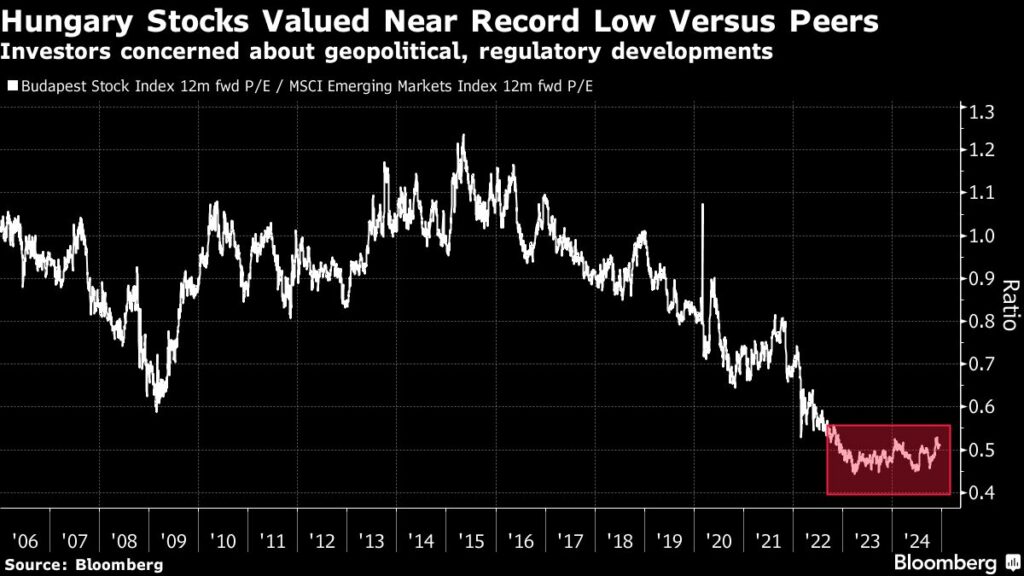(Bloomberg) — There is arguably no leader in all of Europe who’s more chummy, or ideologically aligned, with Donald Trump than Hungary’s Viktor Orban.
Most Read from Bloomberg
Which goes a long way to explaining why at a time when the mood is markedly glum across European financial markets, there is a sense of optimism in Budapest. Here, investors aren’t fretting so much about the prospect of new Trump tariffs or NATO-funding feuds — like they are in, say, Frankfurt or Warsaw — as they consider all the effects the Trump trade may have on the sputtering Hungarian economy and its stock market.
That speculation was thrown into overdrive when the prime minister jetted over to Mar-a-Lago, entourage in tow, for an impromptu sit-down with Trump last week. Among those in attendance that day was Gellert Jaszai, the chairman of the Hungarian telecom 4iG Nyrt. When word got out that Jaszai managed to pigeonhole the billionaire Elon Musk, a close Trump confidante, to discuss possible business deals, the stock soared.
It jumped 13% last week, the biggest advance in more than two years, offering proof that the Trump-Orban alliance is strong enough to lift even small companies in the Hungarian market. For bigger stocks, there’s even more to be gained, analysts and money managers said, if Trump manages to quickly broker an end to the Russia-Ukraine war as he’s pledged.
The war has heightened geopolitical risks and driven down the valuation of stocks all across eastern Europe. And unlike the vast majority of their European peers, the biggest companies in the Hungarian market — like OTP Bank Nyrt, drug maker Richter Gedeon Nyrt and oil group Mol Nyrt — haven’t cut ties with Moscow, which could help them benefit from any warming in relations and rebound in the Russian economy.
The Trump effect “could be a definite boost to the Hungarian stock market,” said Peter Kiss, head of portfolio management at Amundi SA’s unit in Hungary.
Not everyone in Budapest is optimistic about Trump 2.0, especially whether it will indeed produce enough real investment to help Hungary’s ailing economy. Another hurdle is the relatively small size of the Budapest stock market, which has a market capitalization of about $41 billion — less than bourses in Romania, Colombia, Pakistan, Kazakhstan and Egypt. Only five listed companies are worth at least $1 billion.
The Hungarian telecom buoyed by Trump and Musk epitomizes Orban’s business model. 4iG is run by the premier’s allies and has grown through government-backed acquisitions, state contracts and subsidized debt. Still, foreign investors hold less than 1% of its shares, data compiled by Bloomberg show, amid concerns over transparency. This compares with nearly 20% non-resident ownership in OTP, 40% in Richter and 60% in Mol.
Story Continues
Even with potential tailwinds from Trump, Hungary’s stock market still faces the consequences of years of Orban-imposed policies, including battles over funding from the European Union along with loose fiscal policy, all of which hurt the forint’s stability, according to East Capital portfolio manager Eglé Fredriksson. Also, “it’s hard to expect any quick resolution in the Ukraine conflict,” she said.
Insulated Stocks
Amundi’s Kiss said that even if tariffs imposed by Trump rattle Europe and weaken the continent’s currencies, Hungary’s biggest stocks remain relatively insulated because they derive much of their income from neighboring countries in east and south Europe.
“These blue chips can even profit from the weakening of the forint because of their high exposure to foreign markets,” Kiss said.
Such conditions could extend a rally Budapest’s BUX equity index, which has beaten more than 85% of global peers this year amid a shift of domestic savings as local interest rates drop. Yet even after a 30% surge in 2024, valuations remain attractive compared with peers. The index trades at six times its constituents’ expected earnings, half as much as the MSCI emerging market benchmark.
During Trump’s first stint in the White House ending in January 2021, the BUX gained 33% in dollar terms, while the MSCI benchmark index jumped 57% in the period.
Rollo Roscow, an EM fund manager at Schroders Plc in London, said that much depends on what type of peace is achieved. If it includes security guarantees for Ukraine deemed strong enough to prevent the return of war, it would be short- and long-term positive. A weak deal, on the other hand, may be a “long-term negative for regional risk,” he said.
“Given Richter and OTP have Ukrainian and Russian exposures, both would benefit from a lasting settlement in the war and provide a further boost to valuations,” Roscow said. “Both stocks are cheap relative to their quality underlying fundamentals.”
In a way, the cozy ties between Trump and Orban may not need to have a big impact on Hungary’s economy to affect the BUX. “Budapest is a small market with idiosyncratic drives for large stocks there that don’t necessarily have any relation to Hungarian macro,” Roscow said.
–With assistance from Zoltan Simon and Phil Serafino.
Most Read from Bloomberg Businessweek
©2024 Bloomberg L.P.
Source link : http://www.bing.com/news/apiclick.aspx?ref=FexRss&aid=&tid=67628bd8ad334111849830145e0ec150&url=https%3A%2F%2Ffinance.yahoo.com%2Fnews%2Ftrump-trade-comes-europe-giving-060000023.html&c=16548312098951892121&mkt=de-de
Author :
Publish date : 2024-12-17 22:00:00
Copyright for syndicated content belongs to the linked Source.
